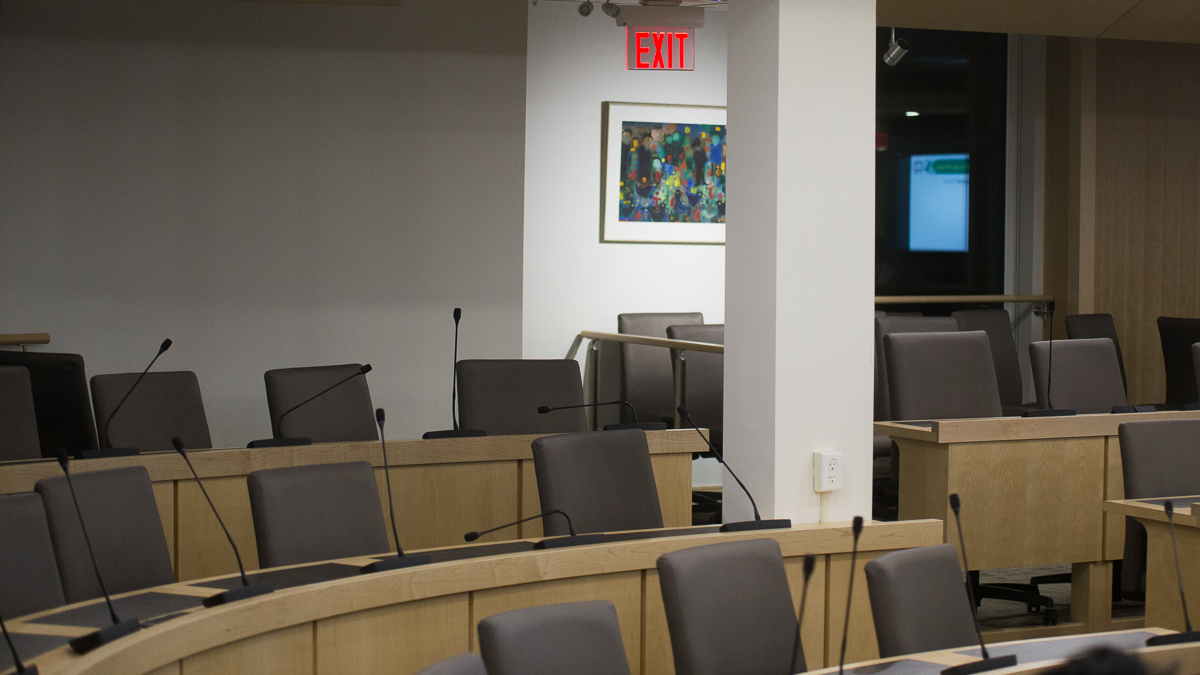DIE Board rules councillor is eligible to serve on council, election bylaws to be clarified
A motion will be brought to council to clarify elections bylaws.
 Rosty Soroka
Rosty SorokaOn September 19, the Discipline, Interpretation, and Enforcement Board (DIE Board) released a ruling that determined a councillor was eligible to serve on Students’ Council. A motion will soon be brought to Students’ Council to clarify election bylaws.
Complaint alleged councillor is ineligible for their seat
On July 13, a complaint was filed to the DIE Board by Chrsitian Zukowski, the speaker for Students’ Council. The complaint was filed after Zukowski received an email alleging that an unnamed councillor was ineligible for their seat. Zukowski worked with governance staff to confirm that Haruun Ali, an arts councillor, was not enrolled in the faculty of arts at the time.
The complaint requested the removal of Ali from council immediately, alleging that Ali was in contravention of Bylaw 100, section 3(2). The bylaw reads “every councillor is required to be enrolled in the faculty they represent.”
Zukowski withdrew the complaint so that council would be able to discuss the issue.
At the Students’ Council meeting on August 9, Ali gave a presentation on his eligibility to serve on council, and a motion was put forward for the speaker to resubmit the complaint.
During his presentation, Ali said that Lucas Marques, the previous Students’ Union (UASU) Chief Returning Officer (CRO), confirmed he was eligible to run for an arts seat. The councillor also confirmed that he was enrolled in the faculty of arts in the Fall 2022 term.
Council passed the motion for the speaker of council to resubmit the complaint, so that the DIE Board could provide a ruling on the situation.
DIE Board rules that Ali was eligible and properly elected
On September 19, the DIE Board released a ruling for the speaker’s complaint. The DIE Board’s mandate is to interpret and enforce UASU legislation, which includes adjudicating disputes that arise when legislation is unclear.
The ruling explained that according to bylaw, a councillor is only eligible to represent the faculty they are enrolled in. When Ali was elected in the March 2022 UASU elections, he was not in the faculty of arts. However, Ali was admitted into the faculty of arts for the Fall 2022 term.
Candidate eligibility does not require a nominee to be enrolled in the faculty they will represent. The nominee only needs to be enrolled at the U of A and in good academic standing.
The ruling said that “there is confusing direction from bylaws regarding councillor eligibility, and also the timing of a candidate’s enrollment or admission in a particular faculty.”
The DIE Board ruled that Ali could not be removed from council as he was eligible to be a candidate for the faculty of arts and was properly elected. The board provided three directions to remedy ambiguities in bylaws to prevent the situation from occurring again.
The first recommendation was an amendment to bylaw to require that nomination packages provide either confirmation of current enrollment or admission to the faculty they seek to represent. The second amendment to bylaw recommended requiring every councillor be enrolled in the faculty they represent, or must be admitted to the faculty they will represent. The board also recommended adding eligibility violations to bylaw so that council has the authority to remove councillors in contravention.
Ali “pleased” to hear about ruling and recommended bylaw change
Ali said that he was “very pleased” to hear about the DIE Board ruling.
“[The DIE Board ruling] includes mostly everything I’ve been saying for the past few months, which was that this was never my fault.”
The councillor added that the situation was a “waste of about two months” and put student governance into question.
“If we continue to fight amongst ourselves, and not show value for dollar to students, I think we’re going to run into some big problems in the next few years here.”
Ali also said that he was pleased to see the recommendation to change bylaw from the DIE Board.
“I think it was a good learning opportunity for everyone and I just hope that council as a body is able to come back together and we’re able to function and we’re able to actually govern this organization.”
Motion to clarify bylaws to be brought to Students’ Council
Levi Flaman, a business councillor and chair of the bylaw committee, said that a motion will soon be brought to council to clarify election bylaws.
At the Students’ Council meeting on November 15, Flaman brought a motion to approve Bill 1: Simplifying and Clarifying Governance Documents. Flaman said that Bill 1 is meant to restructure bylaw and does not change any functional wording.
“The thought process was if you want to look something up something that’s election-related … you can go in there and you can see, okay, well, I’m looking for information in this bylaw. If you don’t find what you need, you don’t have to look very far. Everything’s kind of nested in this one grouping,” Flaman said.
The next bill to be brought to council will be on electoral reform. Flaman said that there were several recommendations that came out of the DIE Board ruling that “they felt should be addressed in [the next bill].”
“[In the next bill] we’re going to go through and shore up some of these inconsistencies and uncertainties that came up not just with that ruling, but just other things we’ve identified from years past.”
Flaman emphasized council needs to clarify bylaw and governance needs to be consistent in how they apply bylaw.
“What good is our [legislation] if it’s not followed?” Flaman asked.
“If the group that’s in charge of drafting and adhering to these rules can’t even do it, how [is] … your regular average undergraduate student supposed to [understand]?”



